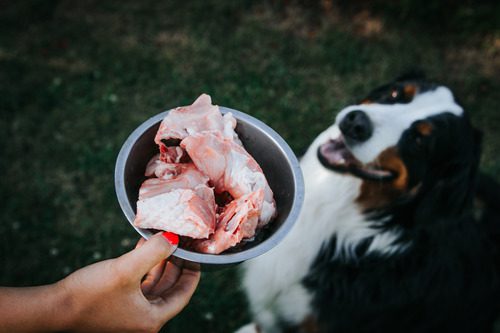Can Dogs Eat Turkey Bones?
Thanksgiving and other festive holidays often include a delicious turkey feast, and you might wonder if your furry friend can join in the fun. Specifically, can dogs eat turkey bones? While it might seem like a natural treat, there are important considerations to keep in mind to ensure your pet’s safety and health. In this blog, we will explore why turkey bones can pose a risk to dogs, the potential consequences of feeding them to your pet, and safe alternatives to share with your canine companion. For personalized advice and urgent care for your pet, call Pets Furst Urgent Care in Langhorne, PA, at (215) 755-1000.

Why Are Turkey Bones Dangerous for Dogs?
Feeding turkey bones to dogs can be hazardous for several reasons. The bones, especially when cooked, become brittle and can easily splinter. These sharp fragments can cause serious injuries to your dog’s digestive system. Turkey bones can splinter into sharp pieces, which can:
- Pierce the esophagus
- Cause blockages in the intestines
- Damage the stomach lining
- Lead to internal bleeding
Additionally, the bones can pose a choking hazard, especially to smaller dogs. Ensuring your pet avoids turkey bones can prevent these severe health issues.
Potential Health Issues from Ingesting Turkey Bones
If a dog ingests turkey bones, it can lead to various health complications. Here are some of the common problems:
- Choking: Small bones can get lodged in the throat, causing choking and difficulty breathing.
- Gastrointestinal Blockages: Bone fragments can cause blockages in the intestines, leading to severe pain, vomiting, and possibly requiring surgery.
- Internal Injuries: Sharp bone pieces can puncture the digestive tract, causing infections, internal bleeding, and peritonitis.
- Dental Damage: Chewing on hard bones can break or crack teeth, leading to dental issues and pain.
If you suspect your dog has ingested turkey bones, it’s crucial to contact a veterinarian immediately.
Symptoms of Bone Ingestion in Dogs
Recognizing the signs that your dog may have ingested turkey bones is essential for timely intervention. Symptoms can include:
- Gagging or choking
- Drooling excessively
- Vomiting
- Lethargy
- Abdominal pain or swelling
- Bloody stools or difficulty defecating
If your dog exhibits any of these symptoms, seek veterinary care promptly to address potential complications.
Safe Alternatives to Turkey Bones
While turkey bones are off-limits, there are plenty of safe ways to let your dog enjoy turkey. Plain, cooked turkey without bones or skin is a safe and tasty treat for your dog. Turkey jerky made for dogs can also be a nutritious and enjoyable snack. Turkey-flavored dog treats are another safe and delicious option to bones for your companion. Always ensure any turkey treat is free from seasoning, spices, and added ingredients that could harm your dog.
What to Do if Your Dog Eats a Turkey Bone
If your dog manages to eat a turkey bone, it’s crucial to act quickly. Here are the steps you should take:
- Stay Calm: Panicking can make the situation worse. Keep your dog calm and assess the situation.
- Check for Choking: If your dog is choking, try to remove the bone carefully without pushing it further down the throat.
- Observe Your Dog: Monitor for any signs of distress, such as coughing, vomiting, or difficulty breathing.
- Contact Your Vet: Call your veterinarian or Pets Furst Urgent Care at (215) 755-1000 immediately for advice and next steps.
Veterinary Intervention
In many cases, veterinary intervention will be necessary. Your vet might perform an examination, X-rays, or other diagnostic tests to determine if the bones have caused any internal damage or blockages. Treatment options can vary depending on the severity of the situation, ranging from inducing vomiting to surgery.
Preventing Accidental Ingestion of Turkey Bones
Preventing your dog from accessing turkey bones requires some preparation, especially during holidays. Here are some tips:
- Dispose of turkey bones in a secure, dog-proof trash can.
- Ensure your dog is supervised and cannot access the table or counter where food is being prepared or served.
- Inform guests about the dangers of feeding turkey bones to your dog and ask them not to share table scraps.
Training Tips for Preventing Food Theft
Training your dog can help prevent them from snatching food. Consider these training tips:
- Training your dog to respond to the “leave it” command can prevent them from grabbing harmful items.
- Provide a designated area where your dog can stay during meals, away from the temptation of food.
- Reward your dog for good behavior and not begging at the table.
With consistent training, your dog can learn to avoid unsafe foods and behaviors.
Keeping Your Dog Safe and Happy During the Holidays
While it might be tempting to share your turkey dinner with your dog, it’s essential to avoid giving them turkey bones. The risks far outweigh any potential benefits, and safer alternatives are readily available. By understanding the dangers and taking preventive measures, you can ensure your pet’s safety and enjoy a worry-free holiday season. If you have any concerns or need urgent care for your pet, contact Pets Furst Urgent Care in Langhorne, PA, at (215) 755-1000. Our team is here to help you and your furry friend stay healthy and happy.
recent posts
About Us
At Pets Furst Urgent Care, your time is important to us. That’s why we’re here: To provide the highest level of pet urgent care possible on a walk-in basis. That means you can stop in at any time during our office hours to see a knowledgeable veterinarian.

